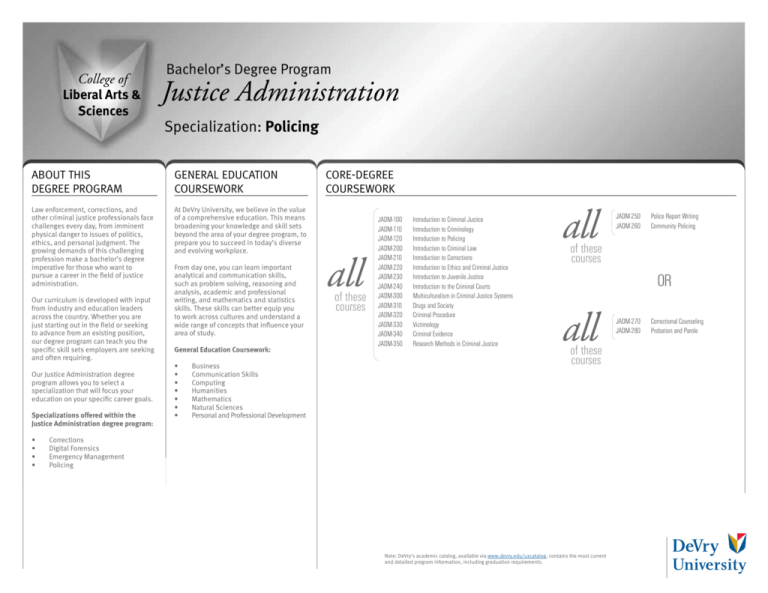
College of
Liberal Arts &
Sciences
Bachelor’s Degree Program
Justice Administration
Specialization: Policing
about this
degree program
general education
coursework
Law enforcement, corrections, and
other criminal justice professionals face
challenges every day, from imminent
physical danger to issues of politics,
ethics, and personal judgment. The
growing demands of this challenging
profession make a bachelor’s degree
imperative for those who want to
pursue a career in the field of justice
administration.
At DeVry University, we believe in the value
of a comprehensive education. This means
broadening your knowledge and skill sets
beyond the area of your degree program, to
prepare you to succeed in today’s diverse
and evolving workplace.
Our curriculum is developed with input
from industry and education leaders
across the country. Whether you are
just starting out in the field or seeking
to advance from an existing position,
our degree program can teach you the
specific skill sets employers are seeking
and often requiring.
Our Justice Administration degree
program allows you to select a
specialization that will focus your
education on your specific career goals.
Specializations offered within the
Justice Administration degree program:
From day one, you can learn important
analytical and communication skills,
such as problem solving, reasoning and
analysis, academic and professional
writing, and mathematics and statistics
skills. These skills can better equip you
to work across cultures and understand a
wide range of concepts that influence your
area of study.
General Education Coursework:
•
•
•
•
•
•
•
Business
Communication Skills
Computing
Humanities
Mathematics
Natural Sciences
Personal and Professional Development
core-degree
coursework
all
of these courses
JADM-100
JADM-110
JADM-120
JADM-200
JADM-210
JADM-220
JADM-230
JADM-240
JADM-300
JADM-310
JADM-320
JADM-330
JADM-340
JADM-350
Introduction to Criminal Justice
Introduction to Criminology
Introduction to Policing
Introduction to Criminal Law
Introduction to Corrections
Introduction to Ethics and Criminal Justice
Introduction to Juvenile Justice
Introduction to the Criminal Courts
Multiculturalism in Criminal Justice Systems
Drugs and Society
Criminal Procedure
Victimology
Criminal Evidence
Research Methods in Criminal Justice
all
JADM-250
JADM-260
of these courses
all
of these courses
•Corrections
•
Digital Forensics
•
Emergency Management
•Policing
Note: DeVry’s academic catalog, available via www.devry.edu/uscatalog, contains the most current
and detailed program information, including graduation requirements.
Police Report Writing
Community Policing
OR
JADM-270
JADM-280
Correctional Counseling
Probation and Parole
Bachelor’s Degree Program
College of
Liberal Arts &
Sciences
Justice Administration
Specialization:
Policing
career-focused
coursework
about this
specialization
knowledge
and skills
Police professionals ensure public safety by maintaining order, responding to emergencies,
protecting people and property, enforcing laws and promoting good community relations.
Law and Government2 — Understand
Typical tasks include: preparing reports, documenting incidents and activities, and
pursuing and arresting suspects and criminals. As a graduate, you may be called on to
testify in court to present evidence or act as a witness, or to supervise and coordinate
the investigation of cases. At the management level, police professionals supervise and
coordinate the activities of a police force.
Graduates of DeVry University’s Justice Administration degree program with a specialization
in Policing may consider careers including:
•
Alcohol Law Enforcement Agent
•
ATF (Bureau of Alcohol, Tobacco, Firearms and Explosives) Agent
•
Border Patrol Agent
•
Detective/Investigator
•
Homeland Security Specialist
•
Military Police
•
Police/Patrol Officer
•
Police Sergeant/Lieutenant/Captain
•
Public Safety Officer
•
State Trooper
According to the Bureau of Labor and Statistics, employment of police and detectives is
expected to grow 10 percent between 2008 to 2018, about as fast as the average for all
occupations. According to its Occupational Outlook Handbook, “population growth is the
main source of demand for police services.”1
laws, legal codes, court procedures, precedents,
government regulations, executive orders, agency
rules and the democratic political process.
Public Safety and Security —
2
Become familiar with relevant equipment, policies,
procedures, and strategies to promote effective
local, state or national security operations for
the protection of people, data, property, and
institutions.
all
of these
courses
JADM-400
JADM-403
JADM-407
JADM-410
JADM-490
JADM-494
Interviewing and Interrogation
Cybercrime
Criminal Investigation
Issues in Policing
Senior Project I
Senior Project II
JADM-413
JADM-417
JADM-420
JADM-423
JADM-427
Police Administration
Organized Crime
White Collar Crime
Terrorism Investigation
Crime Scene Investigation
Psychology2 — Observe and interpret human
behavior and performance; individual differences
in ability, personality, and interests; learning and
motivation; psychological research methods;
and the assessment of behavioral and affective
disorders.
Customer Service — Understand principles
and processes for providing customer and personal
services. This includes customer needs assessment,
meeting quality standards for services and
evaluation of customer satisfaction.
2
1
of these
courses
Sociology and Anthropology2 —
Understand group behavior and dynamics, societal
trends and influences, human migrations, ethnicity,
cultures and their history and origins.
Administration and Management2 —
Bureau of Labor Statistics, U.S. Department of Labor, Occupational Outlook Handbook, 2010-11 Edition,
Police and Detectives, on the Internet at www.bls.gov/oco/ocos160.htm (visited June 20, 2011).
O*NET OnLine, Police Patrol Officers, on the Internet at www.online.onetcenter.org/link/summary/33-3051.01
(visited June 20, 2011).
1
2
Become familiar with business and management
principles, business planning, resource allocation,
leadership and coordination of people and
resources.
Telecommunications2 — Operate relevant
broadcasting, control and telecommunications
systems.
Observation2 — Identify information by
In New York, DeVry University operates as DeVry College of New York. DeVry University is accredited
by The Higher Learning Commission (HLC), www.ncahlc.org. DeVry is certified to operate by the State Council of
Higher Education for Virginia. DeVry University is authorized for operation by the THEC. www.state.tn.us/thec.
Nashville Campus – 3343 Perimeter Hill Dr., Nashville, TN 37211. Program availability varies by location. AC0060.
©2014 DeVry Educational Development Corp. All rights reserved. Version 7/7/14
For comprehensive consumer information visit devry.edu/bja
categorizing, estimating, recognizing differences or
similarities, and detecting changes in circumstances
or events.
Stress Tolerance2 — Learn to accept criticism
and deal calmly and effectively with high stress
situations.
Visit DeVry.edu or call 888.DEVRY.04








